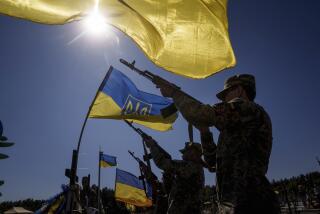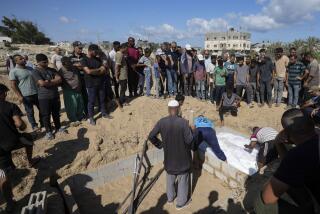Poland holds state burial ceremony for more than 700 victims of Nazi Germany massacres

- Share via
WARSAW, Poland — Poland held a state burial on Monday of the remains of more than 700 victims of Nazi Germany’s World War II mass executions that were recently uncovered in the so-called Valley of Death in the country’s north.
The observances in the town of Chojnice began with a funeral Mass at the basilica for the victims of the Nazi crimes, followed by an interment ceremony with military honors at a local cemetery. The remains were contained in 188 small wooden coffins with ribbons in national white and red colors across them.
Relatives of the victims took part in the events, along with an aide to President Andrzej Duda, local authorities and top officials of the state National Remembrance Institute, which carried out and documented the exhumations.
“We want to give back memory, we want to give back dignity to the victims of the crimes in Chojnice,” presiding Bishop Ryszard Kasyna said.
Duda sent a message saying that the deaths weren’t in vain and the victims will always be held in the national memory, because the only reason they were killed by the Nazis was the fact that they were Polish.
The remains of Polish civilians, including 218 asylum patients, were exhumed from 2021 to 2024 from a number of mass graves on the outskirts of Chojnice. Personal belongings and documents helped identify around 120 of the victims of an execution in early 1945. Among them were teachers, priests, police officers, forestry and postal workers and landowners.
Historians have established that the Nazis, shortly after invading Poland on Sept. 1, 1939, executed some of the civilians in a drive to subdue the nation. The remains of an additional 500 victims are from the January 1945 execution, when the Germans were fleeing the area. Bullets and shells from handguns used by German forces were found in the graves.
Experts will continue to comb the area for more mass graves of the so-called Pomerania Crime.
Poland lost 6 million citizens, or one-sixth of its population, of which 3 million were Jewish, in the war. The country also suffered huge losses to its infrastructure, industry and agriculture.
Scislowska writes for the Associated Press.
More to Read
Sign up for Essential California
The most important California stories and recommendations in your inbox every morning.
You may occasionally receive promotional content from the Los Angeles Times.










